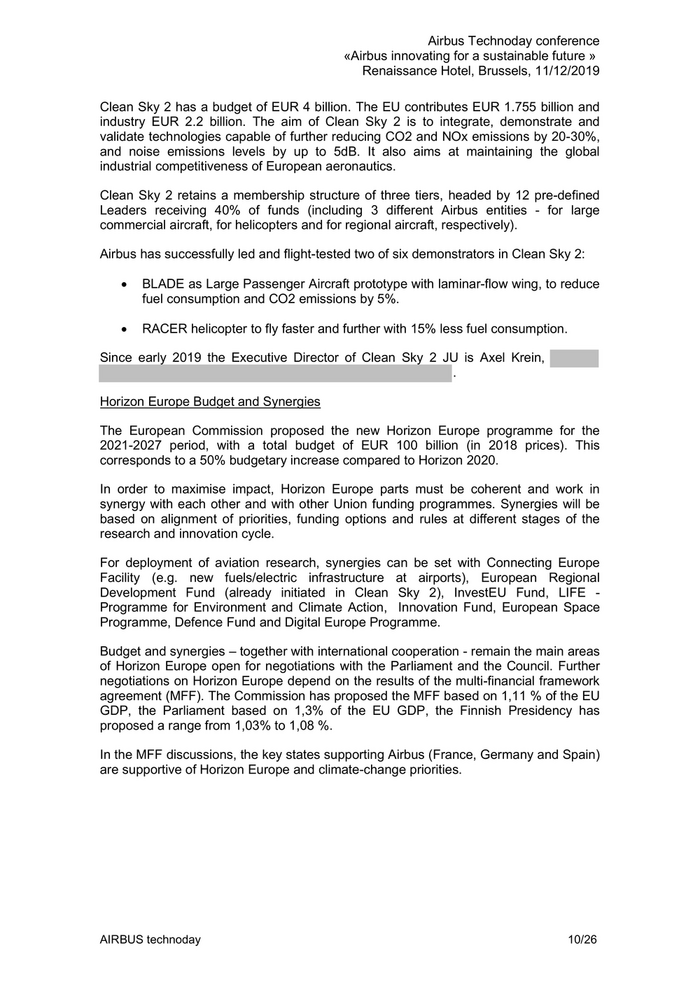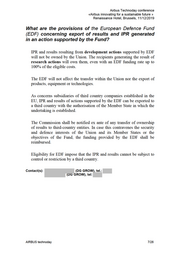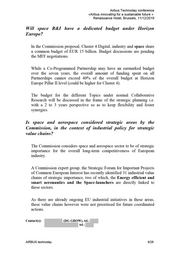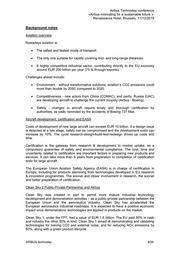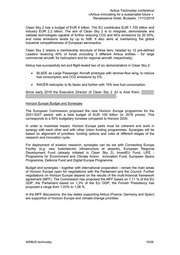20_CabinetGabriel1335-Airbus_Redacted
Dieses Dokument ist Teil der Anfrage „meetings Airbus group since 2017“
Airbus Technoday conference- 05/05/2022 Ref. Ares(2022)3471212 «Airbus innovating for a sustainable future » Renaissance Hotel, Brussels, 11/12/2019 GABRIEL/1335 – meeting with , at AIRBUS technoday Scene setter AIRBUS invited you as the future Commissioner for Innovation to give a welcome speech at their technoday conference, titled “Airbus innovating for a sustainable future”, subject of briefing GABRIEL/1336. You will have a bilateral exchange with . Airbus expects you to discuss the following: • Industrial policy and strategic value chains: aerospace shall be flagged and valorized as a strategic sector. Airbus’s view: - On commercial aircraft, China will break the duopoly and the support of the EU becomes even more critical. - Importance of dual use technologies. - To succeed in sustainable aviation, innovation not taxes is the solution. - Huge investment from US and China in aerospace and defense, the EU needs to step up the game • Aviation partnerships: Exchange on the expectations and the content Airbus’s view: - welcome the co-design work with the Commission on Clean Aviation and Integrated Air Traffic Management, - advocate for rules for participation in line with industry constraints (no cash contribution, freedom to select the best partners, stability over 7 years) • Digital initiatives • Space partnership: exchange on the expectations and the content Airbus’s view: welcome the co-design work with the Commission on the new co- programmed partnership for space, but advocate for a smart industry-led governance • Budget for Horizon Europe and partnerships: Airbus’s view: need EC support for an ambitious budget for R&I, and for the 3 key partnerships with 5 bn€ for aviation research and 2 bn€ for space research AIRBUS technoday 1/26

Airbus Technoday conference «Airbus innovating for a sustainable future » Renaissance Hotel, Brussels, 11/12/2019 e Synergies: Airbus’s view: - support the EC requirements on synergies with other sectors, and already established closed links with other partnerships and sectors (on digital manufacturing, hydrogen, batteries, big data, etc). - want to discuss the Commission on the best ways to implement these synergies, recognizing that synergies do not come for free, and a budget has to be earmarked in Horizon Europe to enable the implementation of such synergies - Missions could be the adequate vehicles to accommodate synergies, with a budget already earmarked. Given the broad scope, several General Directorates were asked to contribute, with positive replies from GROW (both space and defense) and MOVE. A late RTD contribution has been incorporated after deadline. The aviation context Aviation is responsible for more than 2% of the CO2 emissions and more than 3% of the greenhouse gases human-made globally. While air traffic increases 4.5% per year, aviation emissions increase more than 3% per year. This is not consistent with the agreed international objectives of the Paris Agreement. The path to climate neutrality in 2050 is not obvious in aviation. Solutions elsewhere — such as new fuels, fuel cells and batteries — cannot be directly transferred. In order to ensure safety and efficiency, any potential solution requires in-depth research, tests and certification before adoption in aviation. In order to improve environmental performance, research and innovation should: e Accelerate development and deployment of more efficient aeronautics technologies in existing aircraft configurations. «+ Start ambitious projects to mature and adopt disruptive technologies — e.Q. electrification, digitalisation — and advanced aircraft configurations. No single country or company in Europe has the financial, technological and human resources to put aviation on the path to climate neutrality. Airbus leads the public-private partnership CleanSky2 together with other EU aeronautical industries (with EUR 1.755 billion from Horizon 2020). It builds upon its predecessor CleanSky, started in 2008 (with EUR 800 million from FP7). Most CleanSky/2 research results have not been taken up in aircraft development yet, so their actual environmental impact is limited. (Les Echos, 17/09/2019) Horizon Europe envisages a potential Clean Aviation Partnership for boosting the environmental performance of aviation while ensuring safety. An impact assessment is on-going. AIRBUS technoday 2/26

Airbus Technoday conference «Airbus innovating for a sustainable future » Renaissance Hotel, Brussels, 11/12/2019 In reply to the impact assessment public consultation, Airbus has confirmed preference to focus more on the development and effective deployment of technology and to use synergies with other programmes. Objective • Obtain Airbus commitment to co-lead a potential Clean Aviation Partnership more impactful, disruptive and inclusive towards climate neutrality in 2050. AIRBUS technoday 3/26

Airbus Technoday conference «Airbus innovating for a sustainable future » Renaissance Hotel, Brussels, 11/12/2019 Line to take • Assure that space and aerospace sector are of strategic importance for the overall long-term competitiveness of European industry, including in the recently identified 31 industrial value chains of strategic importance, two of which, the Energy efficient and smart aeronautics and the Space-launchers are directly linked to these sectors. • Welcome the commitment, steering and vision of Airbus, notably on air taxis and urban air mobility, as well as the commitment for a Clean Aviation Partnership towards climate neutrality in 2050 with tangible outputs taken up in Airbus products. • Underline your support to strong research partnerships in the aeronautics & space sectors, which is already an indication by the Commission to the importance of the sector and the willingness to prioritise investments. • Underline your expectations for such a Partnership to be much more ambitious and impactful than its predecessors and to engage more disruptive technologies and actors from other sectors, as well to increase the level of commitments and contributions from partners, and clearly demonstrate how the partnerships will deliver on our Union priorities, in particular the Green Deal. • Recall the new co-creation culture across the Commission and with all stakeholders on defining R&I priorities. This includes cooperation across Horizon Europe clusters, including in the areas of digital manufacturing, hydrogen, batteries and big data. Welcome to discover the Strategic Research Agenda being prepared for a clean aviation. • Remind that safety should remain the first priority and the European Union Aviation Safety Agency (EASA) should be involved to prepare properly certification in time. • Share your views on taxes and recall of other measures such as R&I (as in your speech) • In Cluster 5 of Horizon Europe, 11 partnerships –including 2 on aeronautics- will compete for 6 billion EUR. The proposed Green Deal will also require greater R&I efforts to address energy efficiency across Horizon Europe, and will therefore support priorities for clean aviation, in activities earmarked as those of the partnerships or not, within the mobility cluster or outside. • Remind that the European Defence Fund has been proposed with 13 billions and is a new programme to bring fresh investments to the sector, to the benefit of space and aeronautics as well. • Show your understanding for flexible rules for participation in PPP and recall that there are also constraints or requirement set by the European legislators on the use of public funds to the European taxpayer. • Remind that the Multiannual Financial Framework is still under discussion, which includes notably the budget of Horizon Europe and of the European Defence Fund. • Mention the launch of a European Drone Investment - Advisory Platform by the EIB to facilitate the financing of emerging technologies, as an additional source of investments. • Stress the synergies with digital R&I as capacity building to develop favourable ecosystems. AIRBUS technoday 4/26

Airbus Technoday conference «Airbus innovating for a sustainable future » Renaissance Hotel, Brussels, 11/12/2019 o Emphasise the importance to support SMEs in their digitisation across strategic value chains. In this respect, promote the proposed Digital Europe Programme to support digital capacity building and digital innovation hubs across the EU, to help SME to participate in such digitalised value chains. o Solicit the aeronautics sector to reflect on digital industrial platforms to provide a business-to-business competitive edge in supply chains and customer relations. • Highlight the challenges of “greening” transport, and how space and the European Defence Fund can build synergies with Horizon Europe under your leadership. AIRBUS technoday 5/26

Airbus Technoday conference «Airbus innovating for a sustainable future » Renaissance Hotel, Brussels, 11/12/2019 Defensive points Is the Commission considering merging the SESAR and CleanSky Joint Undertakings? We do not envisage merging the two initiatives. Their objectives and approaches are different, underlining a distinction between infrastructure/services (SESAR/ATM) and vehicles (CleanSky). While being both indispensable to the future aviation value chain, the ATM partnership will focus on digital transformation and Clean Aviation on energy transition and decarbonisation. The common subsets of activities are minimal, compared to the full scope and interests of their partnerships. Nevertheless, the two initiatives will have to work closely exploiting synergies and complementarities but keeping the implementing structures independent. We will have to review the current coordination mechanisms, which should exercise policy steering and oversight avoiding overlapping or conflicting activities and double funding. Contacts: (DG MOVE.E3), tel.: AIRBUS technoday 6/26

Airbus Technoday conference «Airbus innovating for a sustainable future » Renaissance Hotel, Brussels, 11/12/2019 What are the provisions of the European Defence Fund (EDF) concerning export of results and IPR generated in an action supported by the Fund? IPR and results resulting from development actions supported by EDF wıll not be owned by the Union. The recipients generating the result of research actions will own them, even wıth an EDF funding rate up to 100% of the elıgible costs. The EDF will not affect the transfer wıthin the Union nor the export of products, equipment or technologies. As concerns subsıdiaries of thırd country companıes established ın the EU, IPR and results of actions supported by the EDF can be exported to a third country with the authorisation of the Member State ın which the undertaking ıs established. The Commission shall be notified ex ante of any transfer of ownership of results to third-country entities. In case thıs contravenes the security and defence interests of the Union and ıts Member States or the objectives of the Fund, the funding provided by the EDF shall be reimbursed. Eligibility for EDF ımpose that the IPR and results cannot be subject to control or restriction by a thırd country. Contact(s): (DG GROW), tel.: (DG GROW), tel: AIRBUS technoday 7126

Airbus Technoday conference «Airbus innovating for a sustainable future » Renaissance Hotel, Brussels, 11/12/2019 Will space R&I have a dedicated budget under Horizon Europe? In the Commission proposal, Cluster 4 Digital, industry and space share a common budget of EUR 15 billion. Budget discussions are pending the MFF negotiations. While a Co-Programmed Partnership may have an earmarked budget over the seven years, the overall amount of funding spent on all Partnerships cannot exceed 40% of the overall budget at Horızon Europe Pillar II level (could be higher for Cluster 4). The budget for the different Topics under normal Collaborative Research will be discussed ın the frame of the strategic plannıng ı.e. with a 2 to 3 years perspective so as to keep flexibility and foster synergies. Is space and aerospace considered strategic areas by the Commission, in the context of industrial policy for strategic value chains? The Commission considers space and aerospace sector to be of strategic importance for the overall long-term competitiveness of European industry. A Commission expert group, the Strategic Forum for Important Projects of Common European Interest has recently ıdentified 31 industrial value chains of strategic importance, two of which, the Energy efficient and smart aeronautics and the Space-launchers are directly linked to these sectors. As there are already ongoing EU industrial ınıtiatives ın these areas, these value chains however were not prioritised for future coordınated actions. Contact(s): (DG GROWV), tel.: tel.: AIRBUS technoday 8/26
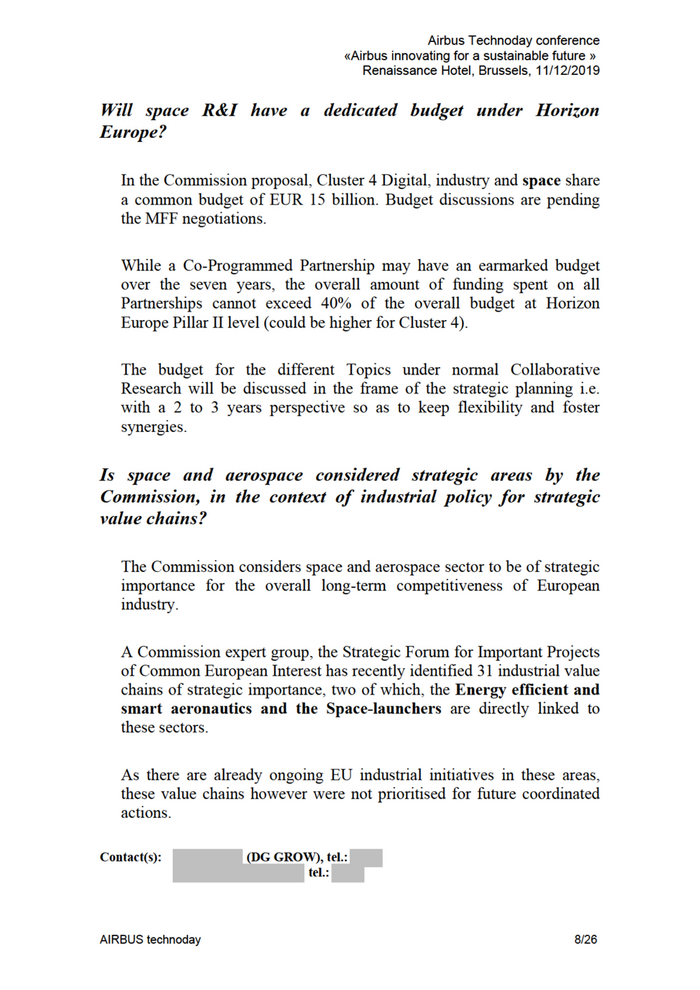
Airbus Technoday conference «Airbus innovating for a sustainable future » Renaissance Hotel, Brussels, 11/12/2019 Background notes Aviation overview Nowadays aviation is: • The safest and fastest mode of transport. • The only one suitable for rapidly covering mid- and long-range distances. • A highly competitive industrial sector, contributing directly to the EU economy around EUR 200 billion per year (75 % through exports). Challenges ahead include: • Environment - without transformative solutions, aviation’s CO2 emissions could more than double by 2050, compared to 2020. • Competitiveness - new actors from China (COMAC), and partly, Russia (UAC) are developing aircraft to challenge the current duopoly (Airbus - Boeing). • Safety - changes in aircraft require timely and thorough certification by authorities, as sadly reminded by the accidents of Boeing 737 Max. Aircraft development, certification and EASA Costs of development of new large aircraft can exceed EUR 10 billion. If a design issue is detected at a late stage, safety can be compromised and the development costs can increase by 10%. The cycle research-design-build-test-redesign drives up costs and time. Certification is the gateway from research & development to market uptake, as a compulsory guarantee of safety and environmental compliance. The cost, time and uncertainty related to certification are important factors in preparing new products and services. It can take more than 5 years from preparation to completion of certification tests for large aircraft. The European Union Aviation Safety Agency (EASA) is in charge of certification in Europe, including for products stemming from technologies developed in EU research & innovation programmes. The sooner and closer involvement in research, the sooner and better preparation of certification. Clean Sky 2 Public-Private-Partnership and Airbus Clean Sky was created in part to permit more mature industrial technology development and demonstration activities – as a public-private partnership between the European Union and the aeronautics industry. Clean Sky has accelerated the European aeronautics industrial roadmaps. It is expected to have a positive economic impact once demonstrators’ technologies are applied in products on the market. Clean Sky 1, under the FP7, had a value of EUR 1.6 billion. The EU paid 50% in cash and industry the other 50% in kind. Clean Sky 1 aimed at demonstrating and validating technologies for halving CO2 and external noise, and for reducing NOx emissions by 80%, along with a green product lifecycle. AIRBUS technoday 9/26
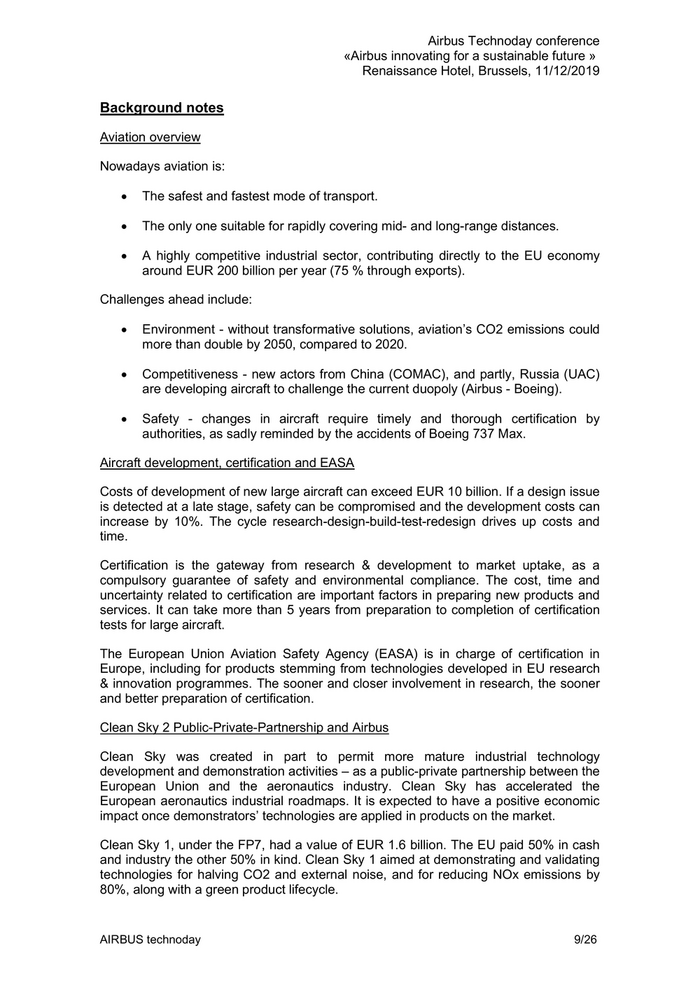
Airbus Technoday conference «Airbus innovating for a sustainable future » Renaissance Hotel, Brussels, 11/12/2019 Clean Sky 2 has a budget of EUR 4 billion. The EU contributes EUR 1.755 billion and industry EUR 2.2 billion. The aim of Clean Sky 2 is to integrate, demonstrate and validate technologies capable of further reducing CO2 and NOx emissions by 20-30%, and noise emissions levels by up to 5dB. It also aims at maintaining the global industrial competitiveness of European aeronautics. Clean Sky 2 retains a membership structure of three tiers, headed by 12 pre-defined Leaders receiving 40% of funds (including 3 different Airbus entities - for large commercial aircraft, for helicopters and for regional aircraft, respectively). Airbus has successfully led and flight-tested two of six demonstrators in Clean Sky 2: • BLADE as Large Passenger Aircraft prototype with laminar-flow wing, to reduce fuel consumption and CO2 emissions by 5%. • RACER helicopter to fly faster and further with 15% less fuel consumption. Since early 2019 the Executive Director of Clean Sky 2 JU is Axel Krein, . Horizon Europe Budget and Synergies The European Commission proposed the new Horizon Europe programme for the 2021-2027 period, with a total budget of EUR 100 billion (in 2018 prices). This corresponds to a 50% budgetary increase compared to Horizon 2020. In order to maximise impact, Horizon Europe parts must be coherent and work in synergy with each other and with other Union funding programmes. Synergies will be based on alignment of priorities, funding options and rules at different stages of the research and innovation cycle. For deployment of aviation research, synergies can be set with Connecting Europe Facility (e.g. new fuels/electric infrastructure at airports), European Regional Development Fund (already initiated in Clean Sky 2), InvestEU Fund, LIFE - Programme for Environment and Climate Action, Innovation Fund, European Space Programme, Defence Fund and Digital Europe Programme. Budget and synergies – together with international cooperation - remain the main areas of Horizon Europe open for negotiations with the Parliament and the Council. Further negotiations on Horizon Europe depend on the results of the multi-financial framework agreement (MFF). The Commission has proposed the MFF based on 1,11 % of the EU GDP, the Parliament based on 1,3% of the EU GDP, the Finnish Presidency has proposed a range from 1,03% to 1,08 %. In the MFF discussions, the key states supporting Airbus (France, Germany and Spain) are supportive of Horizon Europe and climate-change priorities. AIRBUS technoday 10/26
